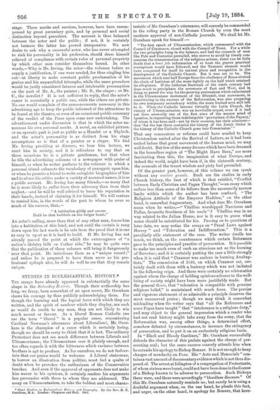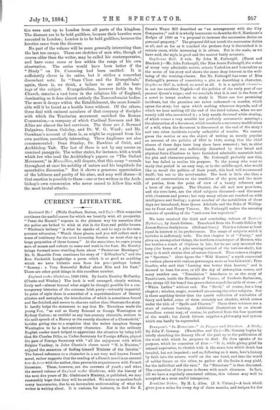STUDIES IN ECCLESIASTICAL HISTORY.*
THE essays have already appeared in substantially the same shape in the Saturday Review. Though their authorship has long, we fancy, been somewhat of an open secret, Mr. Oxenham shows his courage by thus publicly acknowledging them. For though the learning and the logical force with which they are written, and the spirit of candour which they display, are such as would do credit to any man, they are not likely to win much assent or favour. As a liberal Roman Catholic (we use the term " liberal " in a popular sense, remembering Cardinal Newman's utterances about Liberalism), Mr. Oxen- ham is the champion of a cause which is certainly losing, though we should be sorry to think that it is lost. The ordinary Protestant does not see much difference between Liberals and Ultramontanes ; the Ultramontane sees it plainly enough, and too often regards it with the bitterness which variance between brothers is apt to produce. As for ourselves, we do not feel cer- tain that our praise would be welcome. A Liberal statesman, to borrow an illustration from politics, must feel a qualm of doubt when he provokes the enthusiasm of the Conservative benches. And even if the approval of opponents does not make him waver in his opinions, it certainly renders his arguments less persuasive with those to whom they are addressed. The essay on Ultramontanism, to take the boldest and most charac- • Short Studies in Ecclesiastical History and Biography. By the Rev. H. N. Ozenbam, M.A. Loudon : Chapman and Hall. l8Bt.
teristic of Mr. Oxenham's utterances, will scarcely be commended to the ruling party in the Roman Church by even the most cautions approval of non-Catholic journals. We shall let Mr. Oxenham speak for himself :—
" The first epoch of Ultramontanism, which commenced with the Council of Constance, closed with the Council of Trent. For a while the two principles hung in the balance, and had the counsels of men like Pole and Contarini prevailed, who strove to avoid by timely con- cessions the consummation of the religious schism, there can be little doubt that a bond fide reformation of at least the graver practical corruptions would have followed, and the Teutonic element would have conquered for itself its natural place and recognition in the development of the Catholic Church. But it was not to be. The movement which rent half Europe from the obedience of Rome riveted the chain of Latinism all the more tightly on the half which retained its allegiance. If the Isidorian Decretals of the ninth century had done much to precipitate the severance of East and West, and in doing so paved the way for the growing pretensions which culminated in the Ultramontane movement of the fifteenth, that movement, in contributing to the success of the Reformation, was also preparing its own temporary* ascendency within the more limited area still left to it. When the Catholic became virtually the Latin Church, the victory of Ultramontanism was an inevitable sequel, even if it had not been avowedly one of the first aims of the master mind of Ignatius, in organizing those indefatigable praetorians of the Papacy, of whom it has been said—not by their enemies, but their admirers— that for the last three centuries the history of the Jesuit Order is the history of the Catholic Church gone into Commission.' "
That any concessions or reforms could have availed to keep Christendom united after the Revival of Letters, as it had been united before that great movement of the human mind, we may welldoubt. But few of the many dreams which have been dreamed in the boundless region of " The Might Have Been," are more fascinating than this, the imagination of what Europe, and indeed the world, might have been if, in the sixteenth century, the counsels of the truest wisdom and piety had prevailed.
Of the greater part, however, of this volume we can speak without any arriere pelage. Such are the studies in early Church history, the best of which is that entitled, " Conflict between Early Christian and Pagan Thought,"—an essay which suffers less than some of its fellows from the necessarily narrow limits within which the anther has been confined. " The Religious Attitude of the Emperor Hadrian," on the other hand, is somewhat fragmentary. And what does Mr. Oxenham mean when he writes,—" Vitellius worshipped Narcissus and Pallas, favourite freedmen of his uncle " P Vitellius was in no way related to the Julian House, nor is it easy to guess what name should be substituted for his. Passing on to questions of later date, we may notice the essays on " Penal Laws against Heresy " and "Toleration and Indifferentism." This is a peculiarly able statement of the case. The writer dwells too much, we think, on the countenance which certain Reformers gave to the principles and practice of persecution. It is possible to make too much even of such an atrocious act as the burning of Servetus ; and it is certainly putting the case a little strongly when it is said that " Cranmer was zealous in burning Anabap- tists." The commission of 1549, on which Cranmer sat, cer- tainly dealt with them with a leniency which was not imitated in the following reign. And there were certainly no schismatics against whom the charge of holding opinions adverse to the well- being of society might have been more justifiably made. But the general thesis, that " toleration is compatible with genuine religious belief," is maintained with much force. The precise and vigorous statement of so admirable a principle deserves the most unreserved praise ; though we may think it somewhat misleading when the writer says that "all the Reformers and some Popes have taught " that " intolerance is a religious duty," and may object to the general impression which a reader who had not read history might take away from the essay, that the Reformation was, among other things, a determined effort, somehow defeated by circumstances, to increase the stringency of persecution, and to put it on an exclusively religious basis.
In "Black and Bloody Gardiner," Mr. Oxenham successfully defends the character of this prelate against the charge of per- secuting zeal ; but the same success scarcely attends him when he extends his apology to Bishop Bonner. It is not enough to heap charges of mendacity on Foxe. His "Acts and Memorials " con- tains a vast amount of documentary evidence which is not thus dis- posed of. The arrest at Islington of a congregation of Protestants, of whom sixteen were burnt, could not have been done in thediocese of a Bishop known to be adverse to persecution. Such Bishops there were, and there were accordingly " bloodless dioceses." Of
this Mr. Oxenham naturally reminds us ; but surely he is using a doubtful argument when, on the one hand, he pleads this facts and urges, on the other hand, in apology for Bonner, that here:-
tics were sent up to London from all parts of the kingdom. The dioceses are to be held guiltless, because their heretics were executed in London ; London is to be held guiltless, because the heretics came from the dioceses.
No part of the volume will be more generally interesting than the last ten essays. These are.sketches of men who, though of course older than the writer, may be called his contemporaries, and have come more or less within the range of his own observation. The series would have been better if the " Study" on Dr. Cumming had been omitted. It is sufficiently clever in its satire, but it strikes a somewhat discordant note. In "Dean Close and the Evangelicals," again, there is, we think, a failure to see all the bear- ings of the subject. Evangelicalism, however feeble in the Church, remains a vast force in the religious life of England, dominating as it does almost entirely the Nonconformist bodies. The more it decays within the Establishment, the more formid- able will it be found as a hostile force without. Of the others, three deal with eminent members of that company of disciples with which the Tractarian movement enriched the Roman Communion,—a company of which Cardinal Newman and Mr. Allies are almost the last survivors. The three are J. Bernard Dalgairns, Canon Oakeley, and Dr. W. G. Ward ; and Mr. Oxenham's account of them is, as might be supposed from his own position, peculiarly interesting. Three Anglicans are also commemorated : Dean Stanley, Dr. Hawkins of Oriel, and Archbishop Tait. The last of these is not by any means an unmixed panegyric. The writer states, for instance, with a truth which few who read the Archbishop's papers on "The Oxford Movement," in Macmillan, will dispute, that this essay "reveals throughout at once his nobility of nature and his inaptitude for speculative discussion." But it shows a generous appreciation of the loftiness and purity of his aims, and may well shame—if that emotion is possible to them—one or two writers in the Arch- bishop's own communion who never ceased to follow him with the most brutal attacks.



































 Previous page
Previous page